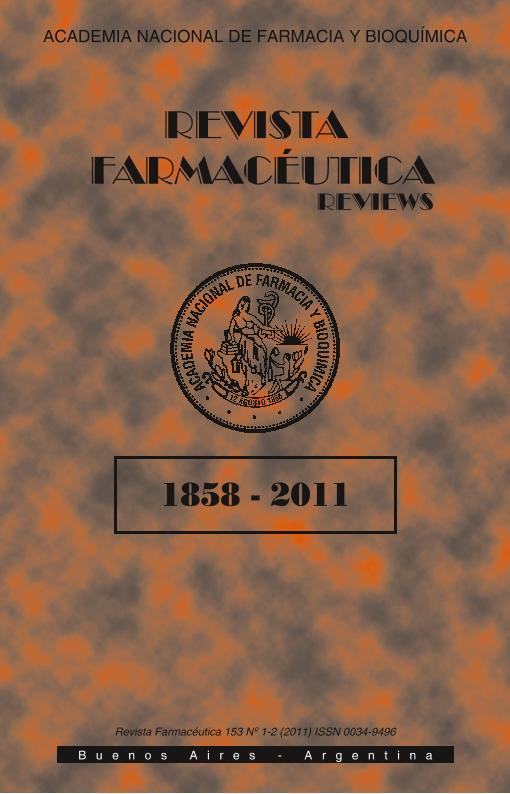Mostrar el registro sencillo del ítem
dc.contributor.author
Santo Orihuela, Pablo Luis

dc.date.available
2019-08-22T15:50:07Z
dc.date.issued
2011-12
dc.identifier.citation
Santo Orihuela, Pablo Luis; Bioquímica de la resistencia a insecticidas en insectos vectores de enfermedades humanas; Academia Nacional de Farmacia y Bioquímica; Revista Farmacéutica; 153; 1-2; 12-2011; 69-82
dc.identifier.issn
0034-9496
dc.identifier.uri
http://hdl.handle.net/11336/81990
dc.description.abstract
El ser humano desde su existencia ha convivido con numerosas especies de insectos a los que se han denominado plagas, debido a sus participaciones activas en la transmisión de enfermedades y a las cuantiosas pérdidas en la producción de alimentos de origen vegetal o animal. Una de las formas de control es el denominado químico que consiste en el empleo de compuestos insecticidas de origen sintético o natural. El uso prolongado de estos compuestos puede llevar al fenómeno de resistencia, mediante el cual se hace necesario incrementar paulatinamente la dosis de uso del insecticida hasta valores de riesgo toxicológico para otros organismos incluyendo al ser humano. El análisis bioquímico mediante la determinación de la actividad de los distintos grupos de las enzimas que participan en la degradación de estos compuestos (metabolismo del insecticida; utilizando distintos sustratos de acuerdo al grupo; es de suma importancia debido a dos motivos. Por un lado porque permite dilucidar si se trata de uno de los más frecuentes causales de resistencia (ya sea en sus orígenes o una vez establecida) y por otro lado porque posibilita el empleo de estrategias alternativas de control, evitando riesgos toxicológicos y el incremento de la resistencia a valores incontrolables.
dc.description.abstract
The human being has coexisted with numerous species of insects since his origins. This kind of insects have been called pests because of their active participation in the transmission of human diseases and numerous losses in the food production from vegetables or animals. One form of management of this species is the chemical control and it is the use of synthetic or natural insecticidal compounds. The prolonged use of these insecticides can lead to the resistance phenomenon, whereby it is necessary to gradually increase the insecticide dose to toxicological values for other organisms including humans. The biochemical analysis is the evaluation of the activity of different groups of enzymes involved in the degradation of these compounds (insecticide metabolism) using different substrates according to the enzymatic group, and it is very important for two reasons. On the one hand it allows to establish whether it is one of the most frequent causes of resistance (on the beginning or once established) and secondly because it allows the use of alternative control strategies, avoiding toxicological risks and the increased of resistance to uncontrollable values.
dc.format
application/pdf
dc.language.iso
spa
dc.publisher
Academia Nacional de Farmacia y Bioquímica
dc.rights
info:eu-repo/semantics/openAccess
dc.rights.uri
https://creativecommons.org/licenses/by-nc-sa/2.5/ar/
dc.subject
Análisis Bioquímico
dc.subject
Insectos
dc.subject
Resistencia
dc.subject
Citocromos
dc.subject
Esterasas
dc.subject.classification
Zoología, Ornitología, Entomología, Etología

dc.subject.classification
Ciencias Biológicas

dc.subject.classification
CIENCIAS NATURALES Y EXACTAS

dc.title
Bioquímica de la resistencia a insecticidas en insectos vectores de enfermedades humanas
dc.title
Biochemistry of insecticide resistance in human desease vector- insects
dc.type
info:eu-repo/semantics/article
dc.type
info:ar-repo/semantics/artículo
dc.type
info:eu-repo/semantics/publishedVersion
dc.date.updated
2019-08-16T18:41:47Z
dc.journal.volume
153
dc.journal.number
1-2
dc.journal.pagination
69-82
dc.journal.pais
Argentina

dc.journal.ciudad
Ciudad Autónoma de Buenos Aires
dc.description.fil
Fil: Santo Orihuela, Pablo Luis. Consejo Nacional de Investigaciones Científicas y Técnicas. Instituto de Investigaciones Científicas y Técnicas para la Defensa. Centro de Investigación de Plagas e Insecticidas; Argentina
dc.journal.title
Revista Farmacéutica
dc.relation.alternativeid
info:eu-repo/semantics/altIdentifier/url/http://www.anfyb.com.ar/wp-content/uploads/2016/07/Revissta_2011-153.pdf
Archivos asociados
